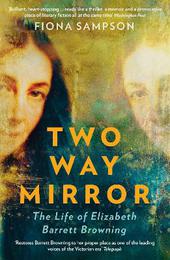
|
Two-Way Mirror: The Life of Elizabeth Barrett Browning
Paperback / softback
Main Details
| Title |
Two-Way Mirror: The Life of Elizabeth Barrett Browning
|
| Authors and Contributors |
By (author) Fiona Sampson
|
| Physical Properties |
| Format:Paperback / softback | | Pages:336 | | Dimensions(mm): Height 198,Width 128 |
|
| Category/Genre | Literary studies - poetry and poets |
|---|
| ISBN/Barcode |
9781788162081
|
| Classifications | Dewey:821.8 |
|---|
| Audience | |
|---|
| Edition |
Main
|
| Illustrations |
8 page colour plate section
|
|
Publishing Details |
| Publisher |
Profile Books Ltd
|
| Imprint |
Profile Books Ltd
|
| Publication Date |
24 February 2022 |
| Publication Country |
United Kingdom
|
Description
'Beautifully told. It is high time Elizabeth Barrett Browning and Aurora Leigh were once again household names.' - Mail on Sunday 'How do I love thee? Let me count the ways,' Elizabeth Barrett Browning famously wrote, shortly before defying her family by running away to Italy with Robert Browning. But behind the romance of her extraordinary life stands a thoroughly modern figure, who remains an electrifying study in self-invention. Elizabeth was born in 1806, a time when women could neither attend university nor vote, and yet she achieved lasting literary fame. She remains Britain's greatest woman poet, whose work has inspired writers from Emily Dickinson to George Eliot and Virginia Woolf. This vividly written biography, the first full study for over thirty years, incorporates recent archival discoveries to reveal the woman herself: a literary giant and a high-profile activist for the abolition of slavery who believed herself to be of mixed heritage; and a writer who defied chronic illness and long-term disability to change the course of cultural history. It holds up a mirror to the woman, her art - and the art of biography itself.
Author Biography
Fiona Sampson is a prize-winning poet and writer, published in thirty-seven languages, who has received international awards in the US, India, Macedonia, Albania and Bosnia. A Fellow of the Royal Society of Literature, the Wordsworth Trust and the English Association, she's published twenty-seven books, including the internationally acclaimed In Search of Mary Shelley. She's received an MBE for Services to Literature, the Newdigate Prize, Cholmondeley Award, Hawthornden Fellowship, and multiple awards from the Arts Councils of England and of Wales, Society of Authors, Poetry Book Society and Arts and Humanities Research Council. Fiona is also a broadcaster and newspaper critic, librettist and literary translator.
Reviews'Beautifully told. It is high time Elizabeth Barrett Browning and Aurora Leigh were once again household names.' - Frances Wilson 'Sampson explores Elizabeth's long illness ... with compassion and scepticism ... Sampson is an astute, thoughtful and wide-ranging guide' - The Times 'A fine contribution to a growing number of biographies that try to pick off the barnacles of rumour and legend that have attached themselves to the lives of writers, and instead reveal them as they really were.' - Robert Douglas Fairhurst 'This new biography [shows that she was ... determined, ambitious and engaged in the public debates of her day. It] restores her to her proper place as one of the leading voices of the Victorian era ... This book is an empathetic - and much-needed - reassessment which tells a fascinating story. The decision to use the present tense [may not be to every reader's taste, but it] underlines the sense that the biographer is bringing her subject back to life. Most importantly, Sampson makes one want to read Barrett Browning' - Lucasta Miller 'The first biography of Barrett Browning in more than 30 years is a nuanced and insightful account, dismantling previous studies [that viewed the poet only in relation to her domineering father or husband]. Fiona Sampson, a poet herself as well as a biographer of Mary Shelley, argues that central to Barrett Browning's story is the construction of identity - both in her life and the myth-making that surrounds it. Such a construction is itself a two-way creation, argues Sampson. "That the life of the body both enables and limits the life of the mind is the paradox of the thinking self."' - New Statesman
|